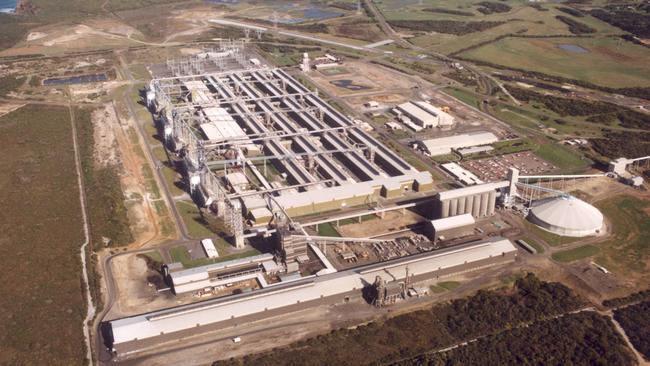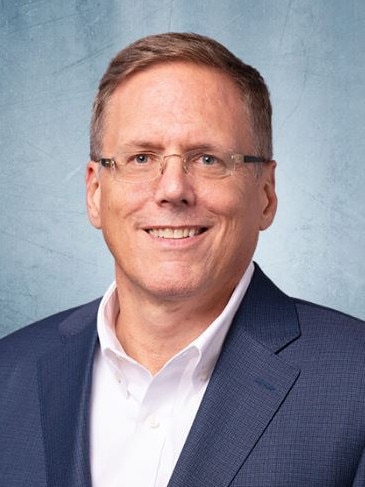A green Portland aluminium smelter can be globally competitive, says Alcoa boss
Victoria’s Portland aluminium smelter can be globally competitive in the long term if Australia keeps up the pace of greening its electricity grid, says Alcoa boss Bill Oplinger.

Victoria’s Portland aluminium smelter can be globally competitive in the long term if Australia keeps up the pace of greening its electricity grid, according to Alcoa chief executive Bill Oplinger.
The new Alcoa boss has launched his term leading the US alumina and aluminium giant with a bang, looking to clear up a host of the company’s legacy issues – including the acquisition of ASX-listed Alumina Limited, closing the loss-making Kwinana refinery in Western Australia, and looking for a buyer for its San Siprian complex in Spain.
But the sale or closure of Portland, Victoria’s biggest energy consumer, was not on Mr Oplinger’s “to do” list.
“We see a greener grid in the future. We have not been running Portland at 100 per cent over the last few years because of some operational problems. But we believe Portland can be globally competitive – and with green sustainable power in Victoria it should be globally competitive,” he told The Australian.
Rio Tinto has spent the last year signing a swath of renewable energy contracts to power its Gladstone aluminium smelter ahead of a similar deadline for the asset, including a deal to underpin the development of a new wind farm with Andrew Forrest-controlled Windlab, which Rio has said is the biggest renewable power purchase agreement to date in Australia. Rio has set a 2030 target to run its Australian smelters from renewable energy.
Mr Oplinger said Alcoa was committed to have net zero carbon emissions by 2050, but its goals for individual assets were tied to both power contracts and the success of its Elysis technology – a joint venture with Rio that promises to eliminate the use of carbon anodes in smelters.
Combined with green energy the technology would be a significant step to decarbonising Alcoa’s smelting operations – eventually including Portland, Mr Oplinger said.

Portland was up for sale only a few years ago, and the smelter’s power contract runs until 2027, but Mr Oplinger said Alcoa saw a long-term future for Portland in its portfolio, and intended to seek a new power deal to keep the smelter in operation.
“We’ve had a very strong track record of dealing with mature assets – repowering them in the case of Portland, which we did a number of years ago and we will strive to do again in 2027,” he said.
The move to clean up Alcoa’s structure through the all-scrip buyout of Alumina will also be a major achievement for the global giant’s new boss. Like BHP’s dual-listed structure, cleaned up under the early leadership of Mike Henry, the split of Alcoa’s key assets is a legacy of the mining megadeals in the early 2000s, when Western Mining Corp demerged its share of its joint ventures in Alcoa onto the Australian market, though Alumina Ltd.
It has taken more than 20 years for an agreed buyout offer to come, and Mr Oplinger said the time was finally right for the merger, which will simplify both Alcoa’s structure and decision-making.
“Essentially the shares have traded into a position that both sets of shareholders could see value in putting the transaction together, and putting the two companies together,” he said.
“Historically when the share prices are high you have to justify a premium for their shares. And in this case, as both sets of shares had come down, that premium from a dollar basis wasn’t that high and they saw the benefit of getting our shares at a fairly low price.”
The offer valued Alumina at about $3.3bn when it was announced in February, but the deal is now worth closer to $4.6bn after a strong rally in aluminium prices.
Alcoa already has the support of Alumina’s biggest shareholder, fund manager Alan Gray, and another block held by China’s CITIC is seen as likely to sell into the bid.
Alcoa still has its challenges in permitting new mines in WA, where the company has fallen afoul over concerns around rehabilitation and its environmental performance under opaque regulations covering state agreements.
But Mr Oplinger said the increased Australian disclosure that will come with an ASX-listing, as well as giving more authority to regional leaders should help improve relations with stakeholders.
“We learned two really strong lessons from the permitting issues in WA. The first is that stakeholder expectations were evolving very quickly and we need to make sure that we’re attuned to changing expectations. The second is that we need strong leadership in our regions. Leadership that is able to take decisions quickly, and meet with local constituents.”
The struggle to win approvals to open up new mining areas in WA has cost Alcoa dearly, with the alumina refineries now forced to process low grade bauxite ore.
But Mr Oplinger said Alcoa believed WA operations could return to the bottom of the global cost curve.
“We view Wagerup and Pinjara, Willowdale and Huntley as premier tier one assets,” he said.
“When we get to Myara North we will be able to increase bauxite grades and get Pinjara and Wagerup back to where they were.”




To join the conversation, please log in. Don't have an account? Register
Join the conversation, you are commenting as Logout